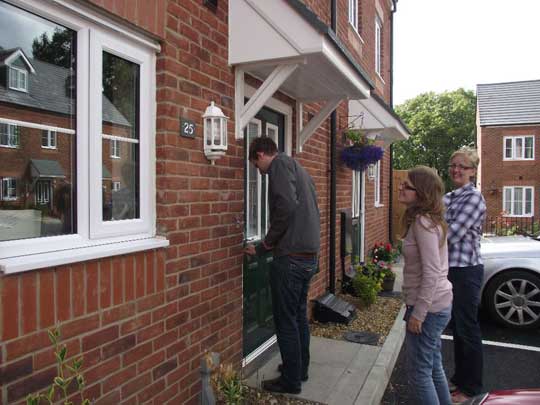
Sir Peter Bottomley (right) has demanded that Taylor Wimpey explain its “unfair ground rent” provisions to the All Party Parliamentary Group on leasehold reform.
Yesterday he told fellow MPs at the APPG meeting chaired by Jim Fitzpatrick, Labour MP for Poplar and Limehouse:
“The ground rent increase may have been legal. It is clearly undesirable. I think it is sharp practice.
“A respectable company should rule out this practice as corporate irresponsibility.
“I’m going to ask when did this practice start; why did it start; and ask for names of the directors who approved it.
“I call for a public debate: Taylor Wimpey can either offer an acceptable defence of these practices, or apologize for the prejudicial arrangements. It then needs to say what is it going to do to put it right.”

The APPG heard evidence from Clair Scott, who bought a Taylor Wimpey leasehold house on an estate of 50 at Silver Birch Close in Lostock, Bolton.
Ground rents here double every ten years from £295 a year to £9,440 in 2060.
Sir Peter said: “£9,000 a year at 5 per cent is the value of the home. It is wiped out in 50 years. George Thomas, the former Speaker of the House of Commons stopped this practice 60 years ago. Yet now it has returned.”
Ms Scott told the APPG in Westminster:
“Buying a leasehold house in Bolton didn’t stand out as unusual to ask because most of the houses here, even the Victorian ones, are leasehold.
“We used the solicitors Taylor Wimpey recommended. We were told items like you can’t paint your front door for two years; you can’t keep a caravan on your drive; and you can’t have livestock on your land.
“These were the points that we remember about the process. We were told that the ground rent was £295 year.
“But it was only when we were trying to sell the property in September that this became an issue. We got to the point where at the last minute the buyers’ solicitors noticed the ground rent clause.
“It doubles every 10 years five times, which meant that by 2060 our ground rent on a house worth £200,000 is £9,440 a year.
“This is not something at all that we recall being highlighted when we bought the property. We looked at our solicitor’s report and ground rents were stated as an item on the title.
“But it was not draw to our attention that this was something unusual, or something to be concerned about and that we would have an issue in the future in selling property.
“Needless to say our house sale fell through.
“Numerous solicitors and estate agents are now saying they’ve never seen anything like this in a lease and that the house is going to be pretty much unsellable. We have been told that mortgage providers will not issue mortgages on this house.
“We contacted Taylor Wimpey and they said it’s not our issue anymore as we have sold on the freehold.”
Only 24 of the 50 houses on Silver Birch Close have doubling ground rents, the remainder have ground rents that rise with RPI (retail price index).
“This decision was taken randomly on January 16 2012 and no one knows why Taylor Wimpey decided to sell these houses with different lease terms. There has been no explanation.”
Ms Scott said the freeholds of the 24 houses were sold to UK Ground Rents Limited for £177,000.
Mr Fitzpatrick said: “This is obviously a very unsavoury practice which we thought had been stopped decades ago.”
Justin Madders, Labour MP for Ellesmere Port and Neston, has been deluged with constituents facing the same issue.
“Taylor Wimpey is going to have a very tough job explaining why they allowed this to happen and I think some very serious questions need to be asked of those professionals who advised on the purchase as well.”





 Pete Redfern: Stop pontificating about the housing crisis and sort out the ground rent scandal of Taylor Wimpey’s own making
Pete Redfern: Stop pontificating about the housing crisis and sort out the ground rent scandal of Taylor Wimpey’s own making






















It is quite clear that anything involving leasehold cannnot be allowed to remain as a ‘gentlemans agreement’ – legislation (and strict enforcement ) is required to protect us homeowners – we are becoming a species under thread of extinction!
Exploitative Ground rents like these, must become illegal, service charges should be for actual services and managing agents should be appointed and or removed by the leaseholders.
Freeholders have pretty much the same amount of power they had as feudal landlords- but now they are also off shore and nicely organised with hordes of scammy lawyers who attempt to intimidate and bamboozle the average leaseholder.
Sir Peter Bottomley is right. Escalating grounds rents are a sharp, shady and unethical practice more in line with an Arthur Daley (dodgy car dealer) approach to business. In fact, I would go so far as to say that it is a deceptive practice. I am a flat owner in the middle of trying to negotiate a lease extension, and one of the offers put on the table by the Freeholders managing agent was an offer of £30,000 plus a complicated and escalating ground rent deal that doubled after ten years and kept doubling every 25 years until the end of the extended lease term. It was not until I sat down and worked it out that I realised the proposed ground rent came to a whopping £234,000 over the new lease term! When I converted into today’s money it came to a £120,000 which would mean that the moment I signed up to it the property would be devalued by £120,000 because no future buyer in their right minds would want to buy a property with such a burdensome level of ground rent agreement.
The Freeholder was very defensive when I raised the question of ethics by responding that it was a perfectly legal offer (sound familiar!) but I would say it was deceptive and manipulative and the only reason they can get away with such sharp practices (in the case of flats at least) is because the so-called ‘marriage value’ element of the Leasehold Reform Law makes the cost of extending a lease so expensive once the unexpired term drops below 60 years and the Freeholders know it, and so they give two offers and whilst the lower non-statutory one may at first glance seem cheaper it is in fact 4-5 times more expensive that the statutory offer once one gets to grips with the numbers behind the new ground rent proposal. The freeholders and their advisers play the system and hide behind the law and I just wanted to point out that it is not only builders like Wimpey Homes who engage in such sharp practices but even professionally qualified managing agents acting on behalf of their freeholder clients are not immune from such shady behaviour.
I agree with Phillip Rainey QC. The sooner the Law is fundamentally reformed the better. And one way of getting a quick win under the belt is to encourage Parliament to strike down the ‘marriage value’ (the Landlord’s profit share of a hypothetical sale) clauses from the Law and at the stroke of a pen reduce the extortionate cost of lease extensions for shorter-leases and thereby discourage the practice of offering informal non-statutory deals with escalating ground rents for flat owners of leasehold properties at least. It may also make the purchase of newish freeholdings from builders like Wimpey Homes less attractive to an investor and thus discourage the gameship that lies behind the practice of selling leasehold properties with a complicated and escalating ground rent structure. Food for thought,
So the freehold of these 24 houses were sold to UK Ground rents for £177000.
Considering the amount of grief this has given to 24 families and the damage to Taylor Wimpeys reputation was it really worth it.
I suggest that Taylor Wimpey now buy back those leaseholds for around £200000.
That gives UK Ground Rents a reasonable profit., and prevents any future damage to their own reputation.
Then sell the freeholds to each of those 24 families at a bargain price, say around £4000.
That gets Taylor Wimpey out of their predicament at a cost to them of around £100000.
Everyone happy and Reputation restored.
Yeah, well.
This is a “chicken bites man” story.
When you let Microsoft excel loose on the issue it turns out that, mainly because the house price inflates as the ground rents escalate, at year 99 the ground rent is the equivalent of 1.04% of the value of the house. Or, £2,080, in today’s money.
Now I agree that’s a far cry from the £295 that people signed up for, but Armageddon it is not.
You can estimate how much an onerous ground rent devalues a property by using a simple proxy: Most people buy with a mortgage. So the money you give the landlord cannot be given to the bank. How much of a property (with normal interest rates of, say 5%) would 2080 – 295 = 1785 buy? Well, a little over £30,000.
So very serious, and Mr Bottomley should be supported in getting to the … resolution of this issue, but those nice folks in Bolton can shed a tear, but they can sleep again.
And anyway, when they come to sell, they might find a buyer with a solicitor as dopey as theirs was!
BTW Solicitors pay around £14,000 per annum insurance premium, PER FEE EARNER, precisely because things do occasionally go wrong. All of these leaseholders were let down by their solicitors if they did not fully understand the implications of this doubling ground rent. (By which I mean the solicitor in his ignorance, or the buyers after the solicitor had not beaten the information into their skulls.)
Forget whether Taylor Wimpy recommended the solicitors, their duty was to their client, the home buyer.
They should all commence legal action immediately against their legal advisors.
Chris Tarpey MBA
Accountant and Ground Rent investor
Here’s a couple of thoughts for Stanley.
Not to be rude, but we are somewhat in the territory of the street trader being interviewed on the tellie. “I buy these shoes for £14 and I sell them for £20. It’s only 6% but I sell a lot and I make a nice living.”
I’ve guessed your proposed increase pattern is 10 36. 61. 86 years, and the start is £400.
At 5% inflation that adds up up to £234,000 cash payable over a 99 year lease.
I’ve guessed that your flat with 99 years is worth £400,000.
So in the first year you are paying £10 per £10,000 of value, as a ground rent.
in year 99 you will be paying £6,400 per annum, and I can hear your howl of pain.
But wait. If the value of your flat goes up by 5% per annum, it will be worth £50,090,000.
Yes, fifty million quid. Don’t yell at me, it’s just mathematics.
In year 99 you will be paying £6,400 gr’s against fifty million. quid
Yep, you’re ahead of me. That’s only £1.28 per £10,000 of the property’s value.
Who’s crying now? The poor bloody landlord, that’s who!!!
He’s just lost 87.2% of the income, in value terms, of his investment..
Your flat’s value (or rather price, which is different) goes up every year. The landlord only gets 4 bites of the cherry, in years 10 36. 61. and 86. So his ground rent income, in terms of value (i.e. how many pints of Guinness, or mars bars, or pints of milk he can buy), is going down by 1 per cent each year, whilst yours is going up by 5 %
And by the way; how do you get £234, 000 to be £120,000 in today’s money? You didn’t really work it out at today’s. silly interest rates, did you?
The £234,000, at 5%, is actually worth £18,543 in today’s money.
Actually, hardly worth debating.
Except to say, slipping in the 10 year increase, instead of a flat 25 50 75 year pattern, gives him a 68% increase in the value of the ground rent, and a 62% increase in the cash amount payable. Be aware!
Well I never said you didn’t need to watch him in the clinches, did I?
So, Stanley. If you would like an accurate assessment of what you should offer, confirm or correct my guesses above, and post your postcode, and I’ll post it up for you.
Cheers.
Chris Tarpey MBA
Accountant and Ground Rent investor